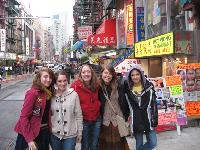

As an experiential component of three Anthropology Department courses, students participated in the April 8-9th field trip in New York City visiting museums, healing centers and Anthropology alumni who now work at non-profit health care institutions and low income outreach initiatives.
Biology of Poverty, taught by Dr. Muller, visited the New York African Burial Ground Memorial and Museum. In 1991, the landmark discovery of more than 400 skeletal remains revealed significant information about the lives and deaths of enslaved Africans and African Americans. Students participated in guided tours of both the museum and memorial to learn about the biological impact of enslavement as it existed in New York City in the 17th and 18th centuries. Particular emphasis of discussion was placed on the ethical issues surrounding the excavation and the involvement of the descendant African American community. The class also visited the Jacob A. Riis Neighborhood Settlement House in Long Island City, Queens, with alumna Melendy Krantz who is the Case Manager for Immigrant Services, an ESOL program that also includes comprehensive case management and legal immigration assistance. In addition to learning about this program, students visited the local neighborhood to assess the resources, i.e. fresh groceries, transportation and parks, available to the community. Students also critically evaluated the use of human remains at The Body Exhibit and visited exhibits of anthropological interest at the American Museum of Natural History.
Dr. Nuttall’s Anthropology of the Body class collaborated with Dr. Muller’s students for the African American burial ground tour and the Body Exhibit. The controversial Body Exhibit was viewed critically in relation to ethical concerns on the acquisition of bodies which were presented to the public as “unclaimed “ corpses from Chinese prisons. Students were encouraged to engage with the lay out of the exhibition and the presentation and relation of “medical” bodies to the wider public. The class also traveled to Grand Central Station and Bryant Park for exercises in bodily proxemics. They noted the movements and negotiation of space between people and people and objects to understand more fully the lifestyles of city dwellers. We also participated in a field trip to the Metropolitan Museum of Art where we analyzed the representation of “cultural bodies” in exhibitions focusing on South Asia and China.
Dr. Hansen’s Medical Anthropology class met with CEO Claire Altman and staff of the Health Care Chaplaincy to learn about the growing area of palliative and patient centered care, religion and health and cultural competency training. They then attended a workshop at Tanenbaum Center for Interreligious Understanding where alumna Annie Levers works as a program developer and consultant in cultural competency in health care and other programs. Internships are available for IC students at both organizations and connections were made during the trip to solidify these opportunities. As part of the class’s study of Latino and Hispanic cultural healing systems, they also visited botanicas, stores that cater to spiritual, herbal, and religious healing of Afro-Caribbean, African American and Hispanic populations. As part of this study they attended a talk on history, diaspora and healing at the Caribbean Cultural Center -African Diaspora Institute, where they were also able to view the current exhibit on Haitian healing and culture titled “Standing with Papa Legba.” Reflective papers on the field trip were incorporated into the experience and students prepared a group presentation for class members who were not able to attend.
https://www.ithaca.edu/intercom/article.php/2011050913531531